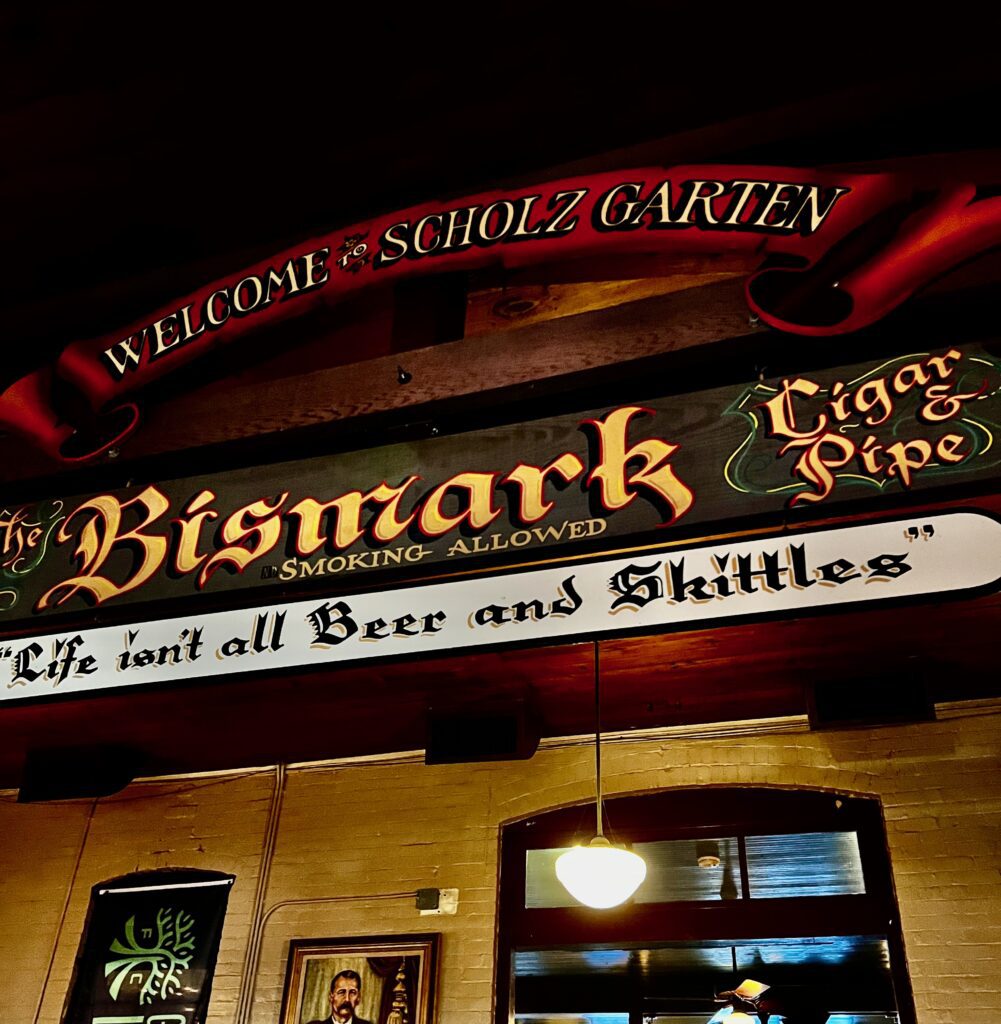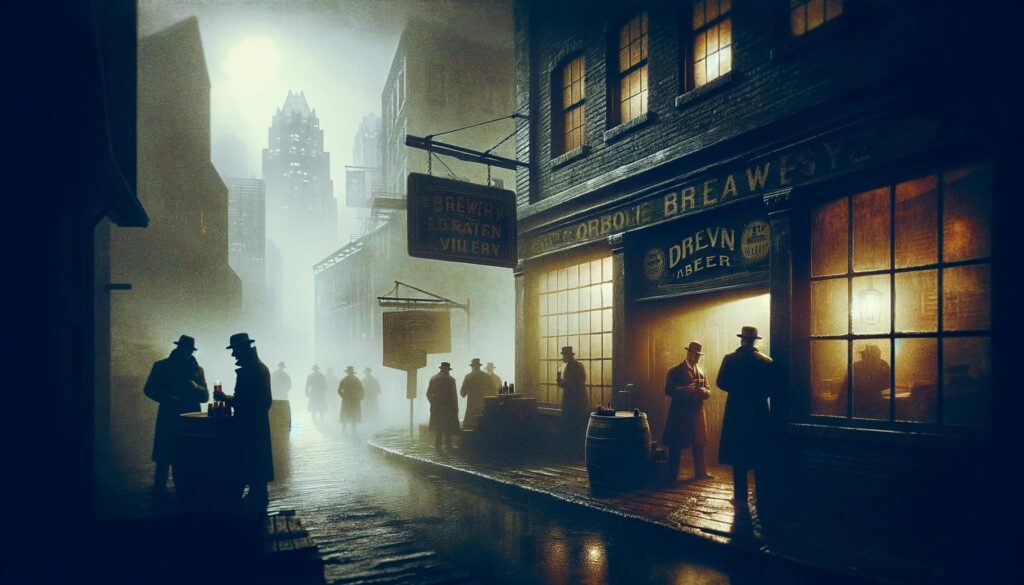 A.I. Generated Image, 2024
A.I. Generated Image, 2024
Austin has a rich beer history with its own unique Texas twist. From Prohibition to the craft beer boom of the 21st century, Austin’s beer scene has evolved dramatically. It has been a pillar of creativity, resilience, and innovation over the years. Let’s take a few moments to look back at Austin beer history.
The Early Days
 Picture by: Jeff St. Andre, 2024
Picture by: Jeff St. Andre, 2024
One of the keystones of Austin’s early brewing industry luminaries was the Johann “Jean” Schneider. In 1860, Schneider began opening a traditional german brewhouse in the Kirchberg’s Saloon on Congress Avenue. Schneider was a brewer of traditional German lagers. The Schneider family even built a subterranean beer vault, with high ceilings and low archways to store their beer in a colder environment. It was declared a Texas State Historical Site in 2009, and is now used as a private dining room for the La Condesa Restaurant. Schneider was killed in a wagon accident before the brewery came to fruition.
Scholz
Scholz Bier Garten, nestled in the heart of Austin, Texas, is one of the oldest continuously operating beer garden in America. Founded in 1866 by German immigrant August Scholz, the beer garden quickly became a cultural hub in Austin. Both for German settlers and as a beloved gathering place for all Austinites. Scholz Garten has witnessed the ebb and flow of Austin’s history, serving as a social center for political gatherings, community events, and musical performances.
After Scholz’s death in 1891, the family sold Scholz Garten to the St. Louis-based Lemp Brewing Company, makers of Falstaff Beer. In l908 a German singing club called The Austin Saengerrunde purchased the property and built a bowling alley near the biergarten.The six-lane center at Saengerrunde Hall is one of the oldest continuous operating bowling centers in the United States.
Scholz hosted a celebration for the University of Texas football team’s first undefeated season in 1893. They have also been honored by the 1966 Texas legislature. The legislature recognized Scholz as “a place for Texans of discernment, taste, culture, erudition, epitomizing the finest tradition of magnificent German heritage in our State.”
 A.I. Generated, 2024
A.I. Generated, 2024
Prohibition in ATX
The saloons and pubs in Austin faced a significant challenge with the national movement towards Prohibition. The temperance movement, gaining momentum since the late 19th century, cast alcohol as a societal ill. Despite the popularity and economic importance of breweries in the United States, the political and social pressures exerted by the temperance movement eventually led to the enactment of Prohibition in 1920. This federal mandate forced the closure of all alcohol related establishments across the country.
Speakeasies
That is not to say that Austin didn’t have a pretty eclectic speakeasy scene during the prohibition era. To varying levels of federal legality, several key Austin establishments like Scholz Bier Garten, the Tavern, and the Driskill Hotel, all found ways to thrive and survive through prohibition, and all continue as Austin staples today.
According to my grandad, “If you want to find loose morals… for better or worse, look for the politicians.” As the heart of Texas politics, Austin continues to embrace the speakeasy mentality.
Prohibitions and Its Aftermath
 ©FourOaks via Canva.com
©FourOaks via Canva.com
The enactment of Prohibition in 1920 under the 18th Amendment crippled the brewing industry across the United States, including in Austin, Texas. This period saw breweries grappling with stringent federal laws that effectively outlawed their livelihoods. Many tried to remain afloat by shifting production to bottling non-alcoholic beverages or products, a common strategy of the era. However, these adaptations often fell short of sustaining the breweries’ operations. This lead to widespread closures that impacted all but the largest and most diversified breweries.
Post-Prohibition
The post-Prohibition era in Austin and across the country saw a slow and challenging recovery for the beer industry. The few breweries that managed to reopen or start anew faced a market increasingly dominated by a handful of large-scale breweries, wineries, and distilleries, capable of leveraging economies of scale and extensive distribution networks to their advantage. This period marked the beginning of a challenging time for smaller, traditional breweries.
The Resurgance
 Photo by: Jeff St. Andre, 2024
Photo by: Jeff St. Andre, 2024
The late 20th century marked a significant turning point in the United States’ brewing history, with the rise of craft beer challenging the longstanding dominance of major breweries. Consumers began to crave more flavorful, diverse, and quality-oriented beers than those being mass-produced by the industry giants.
This shift in consumer preference and a slow repeal of prohibition era beer/brewing laws, laid the groundwork for growth in the craft brewing sector, a movement that found a particularly receptive audience in Austin, Texas. Additionally, Austin’s vibrant culture and sense of community created the perfect conditions for craft breweries to flourish .
ATX Craft Beer Boom
Austin’s craft beer scene began taking shape in the early 1990s. One of the most influential figures in this movement was Pierre Celis, a Belgian brewer who founded Celis Brewery in Austin. Celis, known for his role in reviving the Belgian witbier style, brought European brewing traditions to the heart of Texas. His dedication to quality and authenticity helped establish Celis Brewery as a cornerstone of Austin’s burgeoning craft beer scene.
The early 2000s witnessed a significant increase in Austin craft breweries. This period of expansion was characterized by a focus on innovation, quality, and the use of local ingredients. These principles that continue to define Austin’s craft beer culture today. Austin breweries have continuously garnerd recognition for their exceptional beers, their contributions to the local economy, and community.
Keeping Austin Crafty
 Photo by: Jeff St. Andre, 2024
Photo by: Jeff St. Andre, 2024
The craft beer scene in Austin, Texas, has experienced an explosive growth in recent years. It has evolved into an eclectic and talented mix of breweries that cater to an array of tastes and preferences. This dynamic range includes everything from small-scale nano-breweries nestled in neighborhood corners to larger establishments with a national distribution footprint.
Standout Breweries
Austin’s craft breweries distinguish themselves through a commitment to creativity and innovation. They frequently utilize local ingredients to craft beers that resonate with the area’s culture and palate. This dedication to quality and uniqueness has elevated Austin’s status within the national craft beer community and attracted international attention.
Among the standout breweries contributing to Austin’s craft beer renaissance is Independence Brewing, celebrated for its exceptional beers and a distinctive taproom attitude that embraces the Austin spirit. Another notable name is Zilker Brewing, nestled in the heart of downtown Austin. Zilker is a favorite among locals and visitors alike. Additionally, Blue Owl Brewing Company prides itself on mastering some of the best sour brews that you will ever taste. From traditional lagers at the Brewtorium to the traditional pilsners at Lazarus Brewing (and all of the experimental bangers along the way), these breweries, among others, serve as pillars of the Cities craft beer scene, each bringing its unique flair and brewing philosophy to the forefront.
Festivals
The culture of craft beer in Austin is further enriched by both a number of exquisite breweries outside of the city and the massive number of festivals and events (beer related and otherwise) that take place in the city every year. Most people have heard of South by Sotuhwest (SXSW), Austin City Limits (ACL), and the Moontower Comedy Festival, but Austin is home to a number of other great events throughout the year.
The Texas Craft Brewers Festival, the largest event of its kind in the state, showcases the diversity and talent of Texas brewers, including many from Austin. Additionally, the Wild West Beer Fest in Pflugerville offers a celebration of local beer, featuring tastings, pairings, and educational events that highlight the community and craftsmanship behind the city’s craft beer success.
Visit Austin’s Best Breweries
These events not only foster a sense of community among brewers and enthusiasts but also offer a platform for showcasing the innovative brewing that characterizes Austin’s craft beer scene. Austin’s craft beer boom is reflective of a broader trend towards artisanal products, with beer enthusiasts seeking out unique brews. The city’s breweries have risen to this challenge, crafting beers that are as diverse and dynamic as Austin itself. From experimental ales to traditional lagers, breweries in Austin offers a myriad of flavors that cater to an ever-expanding audience.
Austin’s breweries are a reflection of Austin’s resilience, creativity, and community spirit. From Prohibition to the thriving craft beer culture of today, beer has played a central role in Austin’s identity. This makes Austin a must-visit destination for beer enthusiasts from around the world. If you would like to explore the Austin brewing scene with an expert beer guide (and designated driver), book your City Brew Tour today!